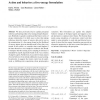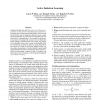108 search results - page 5 / 22 » Agents that Learn to Explain Themselves |
79
Voted
ICALT
2006
IEEE
15 years 5 months ago
2006
IEEE
Observation activity, on instrumented collective learning situations, enables participants to appropriate themselves corresponding systems in their own practice. In this paper, we...
COGSCI
2007
14 years 11 months ago
2007
Languages are transmitted from person to person and generation to generation via a process of iterated learning: people learn a language from other people who once learned that la...
BC
2010
14 years 8 months ago
2010
We have previously tried to explain perceptual inference and learning under a free-energy principle that pursues Helmholtz's agenda to understand the brain in terms of energy ...
AAAI
2007
15 years 1 months ago
2007
Imitation learning, also called learning by watching or programming by demonstration, has emerged as a means of accelerating many reinforcement learning tasks. Previous work has s...
ATAL
2006
Springer
15 years 2 months ago
2006
Springer
An agent's trust decision strategy consists of the agent's policies for making trust-related decisions, such as who to trust, how trustworthy to be, what reputations to ...


